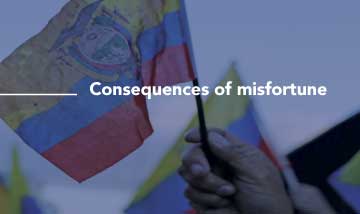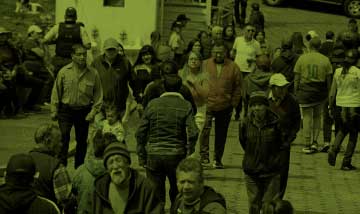Understanding Latin America
Dear readers and colleagues, this month we bring you six articles that reflect the current reality of Latin America, one each from: Brazil, Colombia, Suriname, a couple from Argentina and another about the megafires that have ravaged large swaths of South America.
- In Power, but powerless
- Colombia’s left government is pursuing ambitious labor reforms
- Cultural resistance in the face of Javier Milei’s policies
- Argentina’s feminist movement is at a crossroads
- ‘Dirty political games’: Suriname is selling its gold and timber – at the cost of tribal land rights
- ‘We are in an era of megafires’: new tactics demanded as wildfires intensify across South America
.
IN POWER, BUT POWERLESS
In January, Brazil’s President Luiz Inácio Lula da Silva completed his first year, in his third term, in office. On the surface, it appears to have been a success as the country sees political and economic stability and even renewed authority on the world stage – but this success is volatile, says the author. Brazil’s Congress is dominated by conservatives, who are limiting what Lula and his Workers’ Party (PT) can do, especially when it comes to economic and social policy. Lula was elected in 2022 by a narrow margin over Jair Bolsonaro, mainly because of the alliance he was able to forge between a wide range of parties, including those on the far right who controlled Congress. Now, the strong right-wing forces in this alliance reject any strengthening of the welfare state, while the left has been unable to regain its previous strength. Lula’s first year in office was very pragmatic, as he reversed many of the worst mistakes under Bolsonaro’s government and reinstated measures like the quota system at universities and the successful Bolsa Familia social welfare programme, among others. But his hands are largely tied from taking further action on a number of other important issues, or standing up to the strong agriculture lobby. As Lula tries to balance his alliance with both the left and right, will it cost him political support in the end?
Andreas Behn, February 12, 2024
https://www.rosalux.de/en/news/id/51607/in-power-but-powerless
.
COLOMBIA’S LEFT GOVERNMENT IS PURSUING AMBITIOUS LABOR REFORM (Feb 22)
Colombia’s left-wing president Gustavo Petro plans to overhaul the country’s labor laws through comprehensive reform, which may be one of his most ambitious projects to date. Many countries in Latin America are marked by extreme economic inequality and exploitation of the working class and rural populations, but Colombia may be one of the region’s worst offenders. Since the 1990’s, right-wing paramilitaries, supported by the Colombian military, threatened, kidnapped, murdered, and internally displaced thousands of Colombian unionists amid the country’s sixty-year armed conflict. Even after the peace agreements were signed between the government and the FARC in 2016, the country went on to enshrine regressive reforms into its labor laws and continues to be among the deadliest countries for union leaders. Petro’s proposed reforms would reintroduce long-lost labor rights and give protection for workers’ unions. He proposes, among many measures, stricter regulations, the reduction of subcontracting, and incorporating labor laws that meet the OECD and ILO standards, which include rights such as freedom of association, the right to organize, and the right to collective bargaining. Unsurprisingly, many conservative and pro-business forces are intent on stopping the reform in its tracks. If they pass, are these reforms really enough to change the labor dynamics in Colombia?
Cruz Bonlarron & Keegan Conrad, February 22, 2024
https://jacobin.com/2024/02/gustavo-petro-labor-reform-colombia
.
CULTURAL RESISTANCE IN THE FACE OF JAVIER MILEI’S POLICIES
After only 45 days in office, Argentine President Javier Milei faced a massive popular mobilization against his policies, which were led by the country’s cultural organizations. This is the first time in history that the country’s trade union confederations called upon cultural organizations to protagonize a march, and the results were overwhelming. Close to 200,000 people in the city of Buenos Aires and half a million throughout the country protested Milei’s “omnibus law” on January 24. Though this was the first march led by the cultural sector, it’s not their first nation-wide act of protest. In 2022, they organized under the slogan #NoAlApagónCultural (No to the Cultural Blackout), which effectively saved the cultural industry from losing all state investments. Milei’s omnibus law – a 664-article bill that sought to modify or annul over 300 laws – posed similar threats. It ordered the closure of the National Theater Institute and the National Fund for the Arts; eliminated the book law, which allowed for hundreds of independent publishing houses to emerge in Argentina; and sought to disrupt the promotion for creating, training, and consumption of the arts in general. The bill was eventually shut down in congress, but people suspect that Milei’s government will try to empty cultural institutions without modifying existing laws. The cultural sector insists it is a strong and organized force and will take on this fight.
Daniel Cholakian, February 23, 2024
https://nacla.org/cultural-resistance-in-the-face-of-javier-milei
.
ARGENTINA’S FEMINIST MOVEMENT IS AT A CROSSROADS
Back in Argentina, just as the country’s cultural movement is rallying against President Javier Milei’s destructive policies, so is the country’s feminist movement. In this Q&A style article, Luci Cavallero, Argentinian sociologist and feminist activist from the collective NiUnaMenos (Not one more), talks about the importance of this year’s “8M” protests on International Women’s Day, the challenges and strategies for Argentina’s feminist movement under Milei’s “shock therapy.” Cavallero calls Milei’s government, with its combination of ultra neo-liberal measures, authoritarianism and disregard for the constitutional order, one of the cruelest offensives in Argentinian history. His policies will result in accelerated impoverishment, and even put survival at risk for several sectors of the population, she says. Those most affected will be women and sexual minorities, as they are the ones who generally have irregular salaries or work in the informal sector, and will be hit hard by rapid inflation. Increased poverty will make feminist mobilizing and participation challenging, but the movement is still dedicated to fighting against economic violence and convening the greatest number of sectors, as there is power in numbers. Cavellero believes the feminist movement will produce a massive turn out for this year’s 8M, showing the government there is a movement ready and willing to defend its rights.
Naira Estevez & Lucí Cavallero, February 29, 2024
https://www.rosalux.de/en/news/id/51715/argentinas-feminist-movement-is-at-a-crossroads
.
‘DIRTY POLITICAL GAMES’: SURINAME IS SELLING ITS GOLD AND TIMBER – AT THE COST OF TRIBAL LAND RIGHTS
Suriname boasts that it is the most forested country in the world, but mining (both legal and illegal) as well as logging operations are quickly threatening that statistic, and undermining tribal and Indigenous people’s land rights. Suriname, probably one of the least reported on countries in Latin America, is the only country in the region yet to adopt a legal framework to recognize Maroon and Indigenous people’s collective rights. The Inter-American Commission on Human Rights has ruled several times since 2007 that Suriname needs to recognize and respect the territorial boundaries of about 30,000 Saamaka people, one of the six main groups of Surinamese Maroon people. So far, these rulings remain unheeded. Deforestation in Saamaka lands has since increased fourfold, while concessions to multinational mining companies and timber industry continue in these territories. The Saamaka people have long suffered systemic violation of their rights. In the 1960’s several communities were relocated for the construction of a hydroelectric dam, and were later displaced, tortured and killed during the 1986-1992 internal war. The increased extraction activities in Saamaka territory, and the seeming apathy of local leaders regarding their rights, has continued to make life in Suriname complicated. How are Saamaka leaders dealing with these pressures?
Bram Ebus, February 21, 2024
https://www.theguardian.com/global-development/2024/feb/21/suriname-loggers-miners-forests-deforestation-saamaka
.
‘WE ARE IN AN ERA OF MEGAFIRES’: NEW TACTICS DEMANDED AS WILDFIRES INTENSIFY ACROSS SOUTH AMERICA
South America has endured unprecedented high temperatures in 2024, after the hottest January on record globally, and devastating wildfires came with it. The fires tore across the continent, but Chile has been one of the worst affected, after at least 131 people died in a fire that ripped through the coastal Valparaíso region. In Argentinian Patagonia, a fire scorched more than 6,000 hectares of land in the Los Alerces national park, and fires in Colombia ravaged more than 17,000 hectares. Most of the blazes were sparked by human activity; however, scientists say the combination of El Niño and the climate crisis are responsible for creating conditions like long-term drought, facilitating the rapid spread of fires. In other cases, monoculture of non-native trees for the timber trade caused some fires to spread rapidly in Chile. Though some states, like Chile, have invested millions of dollars in firefighting, experts say governments could be doing a lot more to control these blazes. This could include better land-use planning policies, obliging regional governments to implement national environmental legislation, or implementing better warning and preventative measures for citizens. Is the region seeing a permanent new era of megafires?
Sam Meadows, February 13, 2024
https://www.theguardian.com/global-development/2024/feb/13/megafires-wildfires-chile-argentina-south-america





